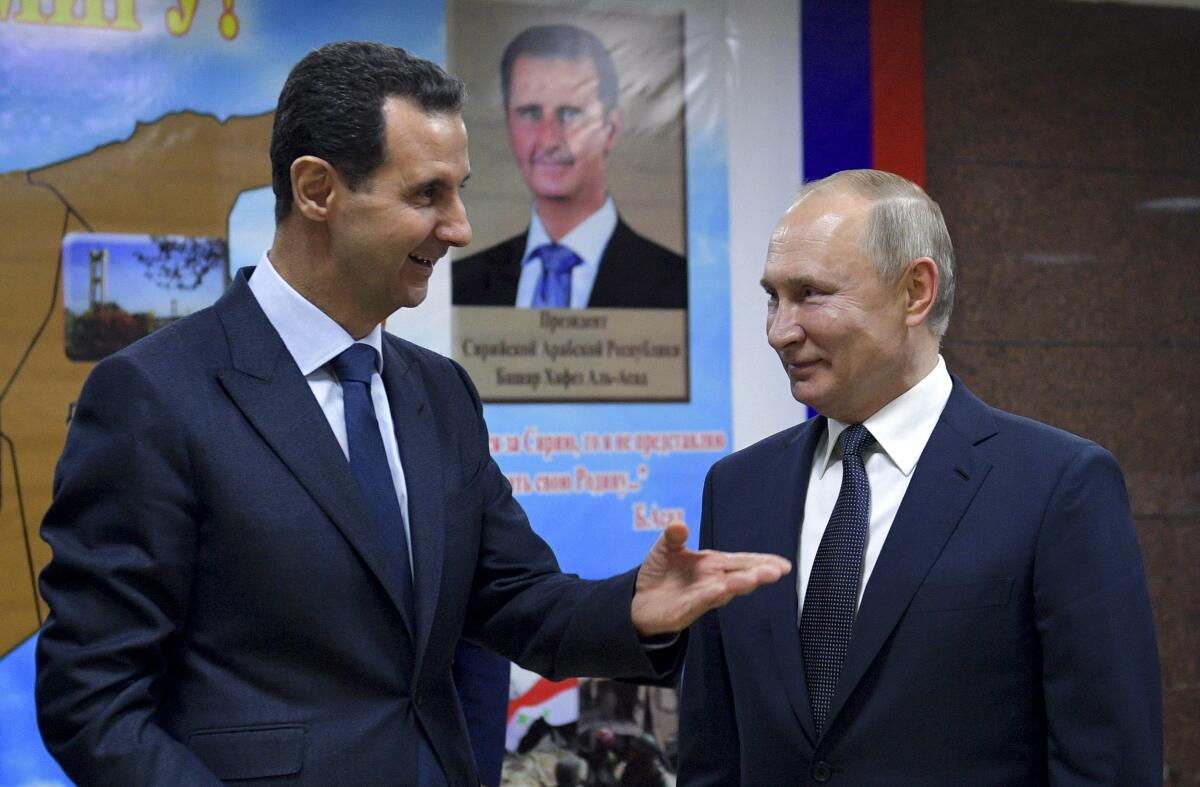Will Russia bring Syrian fighters to Ukraine?

- Share via
BEIRUT — With Russia’s war on Ukraine now in its third week, Russian President Vladimir Putin on Friday approved bringing in volunteer fighters from the Middle East, particularly Syria.
Syria clearly has a rich pool of fighters to draw from. Russia’s military is deeply entrenched in the Mideast country, where its intervention — starting in 2015 — helped Syrian President Bashar Assad gain the upper hand in the ongoing, 11-year civil war.
But less clear is how significant, large or effective a Syrian deployment would be.
On Friday, Russian Defense Minister Sergei Shoigu spoke of “more than 16,000 applications” already from the Middle East, though he didn’t specify which country or countries. Syrian opposition activists say Russia recently began recruitment efforts in Syria for the Ukraine war, but put the scale of those efforts, so far, at far lower numbers.
The announcement came after the Ukrainian government said about 20,000 foreigners from various nations have already joined the so-called International Legion for the Territorial Defense of Ukraine, most of them from Western countries.
So who are these potential pro-Russia volunteers?
No shortage of fighters
Syria’s long, grueling war has given rise to a multitude of armed factions, militias and mercenaries on all sides of the conflict.
The ranks of pro-government paramilitary groups in Syria include tens of thousands of so-called National Defense Forces, Christian militia fighters and army defectors skilled in urban and guerilla warfare. They also include other Russian-supported auxiliary units and militias that fought alongside the Syrian military.
“If need be, Russia could quickly recruit members of these groups to fight in Ukraine,” according to Danny Makki, a Syria analyst.
Joined by Iran-backed fighters from nearby Iraq, Lebanon and elsewhere in the region, these forces not only battled Syrian rebels, they also helped fight the militant group Islamic State after it overran large parts of Iraq and Syria in 2014.
Thousands of mercenaries from the Russian private contractor Wagner Group have also deployed in Syria.
“Given the misery of the Syrian economy, there would be no shortage of combat-hardened men of military age willing to put their lives on the line for a modicum of material gain,” Makki wrote in an analysis for the Middle East Institute, where he is a nonresident scholar.
It wouldn’t be the first time Syrian fighters are recruited for conflicts abroad. Turkey, another major actor in Syria, recruited Syrian mercenaries to boost its fighters in other wars. These include conflicts in Azerbaijan and Libya, where the presence of thousands of foreign fighters, including those from Syria, Sudan and Turkey, remains a major obstacle to peace.
Current recruitment efforts
Evidence is only just beginning to emerge of recruitment among Syrian fighters, particularly in government-controlled territories.
Omar Abu Layla, a Europe-based activist who runs the DeirEzzor 24 Syria war-monitoring group, said recruitment run by the Wagner Group has gone on for days in the eastern province Dair Alzour near the border with Iraq.
Abu Layla said that so far, dozens of men have signed up in the province. He claimed Russia was offering volunteers from the country between $200 and $300 to operate as security guards in Ukraine for six months at a time.
Some Syrian observers and activists suggest any recruitment going on is so far largely symbolic and remains in the very early stages.
On Friday, an ad for a “combat role” in Ukraine was posted on a closed Facebook group for soldiers of the Fourth Armored Division, one of the largest in the Syrian army. It offered a payment of $3,000 depending on an applicant’s expertise and said registration was limited.
Russia’s Defense Ministry-run TV channel aired footage purportedly from Syria showing armed men in uniform it described as would-be volunteers. The men waved Russian and Syrian flags and held up a sign bearing the letter “Z” — used on Russian armored vehicles in Ukraine and now a symbol of support for Russian troops.
Ahmad al-Ahmad, an opposition activist in northwestern Syria, said that in the government-controlled northern town of Ethraya, the Russians have asked senior officers with the Fifth Corps, a Russian-backed Syrian army force, to recruit young men with experience in urban fighting who are ready to go to Ukraine.
As many as 3,000 people have registered in southern Syria, he said. It was not immediately possible for the Associated Press to confirm those reports.
Syrians for Truth and Justice, an independent civil society organization, said in a report this week that it had interviewed at least two Syrians based in Damascus’ countryside who registered with Syrian government security services. They confirmed that lists with potential recruits’ names are to be presented to Russian forces in Syria for approval to deploy to Ukraine.
What do Mideast recruits offer?
Battle-hardened fighters with experience in urban warfare in Syria have, in some cases, little to lose. Still, despite their decade at war, Syrian fighters, for example, are not known for being particularly competent combatants.
Back in 2015, It took the Russian air force, Lebanon’s Hezbollah militants and Iranian forces to shore up Assad’s fledgling military against the opposition. Foreign fighters have usually had the upper hand in battlefields throughout the conflict, including in the war on Islamic State.
Syria experts have also questioned the usefulness of recruits from the Middle East in Ukraine, where they don’t speak the language and are not familiar with the terrain or the harsh weather conditions.
However, if the war stretches on and Russian forces get bogged down, foreign fighters will become a more attractive option.
Makki, the analyst, said reports of Syrians fighting with Russia are premature.
“However, given Moscow’s increasing losses, Syrians make for attractive, low-cost mercenaries in Russia’s eyes,” he said.
More to Read
Sign up for Essential California
The most important California stories and recommendations in your inbox every morning.
You may occasionally receive promotional content from the Los Angeles Times.










